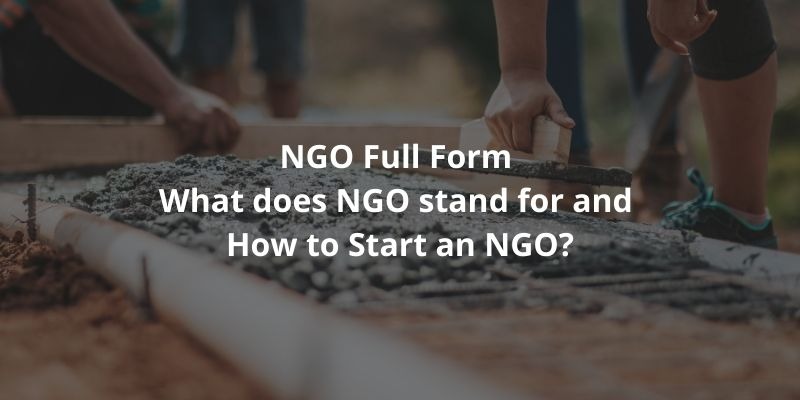Making a Difference: Understanding the NGO acronym and How to Start Your Own Non-Profit Organisation
7 Dec 2023
3 Sep 2020
min read

You may have heard the term ‘NGO’ and wondered what it stands for and what it might entail. An NGO is a non-governmental organization. NGOs are non-profit and can have varying structures on a local, national, or even international scale. If you are passionate about social issues and have charitable goals in mind, setting up an NGO will enable you to transform your passion and charitable goals into tangible outcomes. Passion can only take you so far, however. Anyone can start and run an NGO but not everyone can make their NGO successful – success requires determination, passion, hard work, and of course, full compliance with legal requirements.
In this guide, we will break down what NGOs stand for, the work and role of NGOs, and give some legal guidance on how to start an NGO.
1. What does NGO stand for?
The full form of the acronym NGO is Non-Governmental Organisation. More specifically, NGOs are citizen-based and non-profitmaking organisations that are independent of any governmental influence; as such, they are categorized as the third sector in society. There has yet to be an established or universal definition of an NGO although the term was mentioned in Article 71 of the United Nations Charter.
2. What is the role of NGOs?
NGOs roles range from providing services for target groups, advocating for certain social issues, and raising public involvement and awareness of those issues. Each NGO advocates for a different issue and has its focus area. Common focus areas include gender rights, LGBTQ+ issues, racial rights, environmental issues, the list goes on. Ultimately, however, the main goal of an NGO is simply to better and uplift the welfare of society[1].
There are many NGOs consistently working to reach their goal around the globe right now. Their size varies depending on factors such as the communities they are serving, the amount of funding they receive, and geographic reach. There are approximately 10 million NGOs worldwide, 1.5 million NGOs operating in the United States, and over 2 million operating in India. Here are some notable NGOs:
-
Building Resources Across Communities (BRAC), which aims to tackle extreme poverty around the world and empower people suffering from poverty, illiteracy, disease, and social injustice;
-
Clinton Health Access Initiative (CHAI), a global health organisation aiming to save lives, strengthen integrated health systems around the world and reduce the burden of disease in low and middle-income countries;
-
Cure Violence, an organisation aiming to stop the spread of violence around the world with methods such as detecting and disrupting conflicts, identifying and treating high-risk individuals, and changing social norms;
-
Coalition for Environmentally Responsible Economies (CERES), is an organisation advocating for sustainable business practices and solutions by promoting sustainable use of natural resources and environmental restoration.
3. What types of NGO work are there?
Despite the infinite number of focus areas NGOs can focus on, NGOs can be classified more generally into eight different types based on two general factors: orientation/work, and level of operation. Different types of NGOs have slight differences in their ways of operation.
NGOs by Orientation/Work:
-
Charitable Orientation includes NGOs providing direct assistance aiming to meet the demands and needs of the target group. These NGOs engage in services such as distributing food and clothes, providing transport, and relief activities during disasters and hazards. A top-down effort is often involved while beneficiaries have little role in Charitable NGOs.
-
Service Orientation includes NGOs designing, implementing, and providing services. For example, they provide healthcare services, family planning services, education opportunities, and medical services.
-
Participatory Orientation includes NGOs providing self-help projects where local participants contribute throughout the whole process of projects by providing money, material, tools, labour, and other relevant materials.
-
Empowering Orientation includes NGOs aiming to assist target groups, who might be disadvantaged communities in the society to understand social, political, and economic factors affecting their lives. These NGOs aim to strengthen their awareness and fill up knowledge gaps.
NGOs by Level of Operation:
-
Community-based NGOs are small-scale organisations created by locals that operate within a community, dealing with relatively minor and specific issues that only affect a particular demographic.
-
City-wide NGOs are middle-sized organisations such as chambers of commerce, lion’s club, a coalition of businesses, and associations of community organisations.
-
State NGOs are state-sized organisations that have operations restricted to their country, and they commonly liaise with branches in other cities. Red Cross and YMCA are good examples of famous NGOs.
-
International NGOs are large-scaled organisations providing a range of services such as funding local NGOs and projects initiated by other NGOs, raising funds, and implementing large-scale projects. Examples of international NGOs include OXFAM, UNICEF, Save the Children, etc.

4. Difference between NGO Work vs NPO vs Social Enterprise vs Charitable Organisation/ Charity
How do NGOs differ from NPOs, social enterprises and charities?
NPO
NPO stands for Non-Profit Organisation and refers to an organisation aiming to further social causes instead of commercial interests and to provide services benefiting society. Kinds of NPOs vary across jurisdictions – for example, NPOs in the United Kingdom include unincorporated associations, charitable trusts, charitable companies, charter organisations, etc. NPOs in Australia may take the form of trade unions, charitable entities, local support groups, etc. Some examples of famous NPOs you might recognise include The Bill & Melinda Gates Foundation, Amnesty International, Cato Institute, and the Better Business Bureau.
NPOs are unique as they are not profit-driven; any monetary surplus is used to further pursue their charitable objectives and goals. This means that members of NPOs cannot receive any dividend; instead, the profit can soely go towards the goal they are working towards[2]. They must therefore still raise funds to sustain their normal operations and missions. NPOs usually raise money from donations from private individuals and corporates, investments from external parties, and government funding. For NPOs to be sustainable, they are usually granted a tax-exemption status by the government and do not have to pay income or other taxes.
Social Enterprise
Social enterprises are independent business entities that have clear social and environmental missions that aim to improve society. Social enterprises are slightly different from NPOs in the sense that they pursue profit maximization and use profits generated to reinvest in the business or donate. In this sense, their business is sustained by their own effort instead of relying on external funding and donations. Entrepreneurs tend to rely on the Social Enterprise model instead of the NPO model for their organisation as it is increasingly difficult to obtain funding from outside sources.
Social enterprises have an important role in society as they tackle social issues, create employment opportunities for the marginalized, and provide support to local communities. Here are some notable social enterprises you might have heard of: Child Rights and You, Youth United, and The Big Issue.
Charitable Organisation/Charity
Charities are organisations established by law that have specific charitable purposes and goals solely for the sake of public benefit. Those charitable purposes are usually stated in the laws of different jurisdictions and might include areas such as poverty relief, advancing local culture, promoting religion, promoting education, etc. There are around 168 thousand charities currently running in the UK and 1 million charities registered in the United States. Some famous charities include the National Federation of the Blind, Cancer Research Institute, and Wellcome Trust.
Unlike an NGO, NPO, or a Social Enterprise, charitable organisations are strictly prohibited from making profits. All money generated from their work must be reinvested to achieve their aims. Nevertheless, Charitable Organisations are generally granted tax-exemption status like NPOs, given that they meet certain criteria as stipulated by law. Charitable organisations are usually required to be transparent to the public with respect to their aims, structure, and project implementation plans; this accountability is usually achieved by publishing annual reports.

5. How to Start an NGO?
Starting an NGO might seem difficult and time-consuming at the outset, especially if you are a newbie without any background knowledge or experience in setting up your own company – but don’t worry because we got you covered. The following list contains steps listed in chronological order, which can provide a step-to-step guide for you to set up your own NGO.
Research and Establish Mission Statement
The very first thing to do is to conduct in-depth research into your NGO’s intended focus area and to work out your NGO’s mission and vision. You should ensure that you and/or your partners are equipped with sufficient knowledge of your target services group, such as the major obstacles they are facing and the kind of assistance they are looking to receive. Instead of researching by simply imputing the keyword on the Google search bar, you should consider volunteering in projects initiated by other NGOs to gain first-hand experience.
In addition, you should research the NGOs and other organisations that provide similar services in your area. It might be difficult for your NGO to stand out and be sustainable in the long run if you are merely providing services that are already available, especially since these existing organisations have already gained more experience and funding than your NGO. Nevertheless, you should still try to learn more about these organisations and their missions and consider reaching out to them for collaboration opportunities. This can help to promote your NGO and to maximize public reach as a head starter.
After conducting all the necessary research, you should draft a mission statement that is unique to your NGO. The mission statement should be concise and should sum up the essence of your NGO’s objectives and goals. Your mission statement must be a good one, as it will serve as the foundation and guiding principle for your NGO.
Draft an Article of Incorporation/ Article of Association
The next step is to draft an article of incorporation/article of association. These are legal documents that contain general guiding principles and legal details about the NGO. Generally, the following information is included in the article of incorporation/article of association.
-
Purpose of the article;
-
Name of the NGO;
-
Location of the NGO;
-
Mission and vision of the NGO;
-
Names and details of the board members of the NGO;
-
Board members’ duties and responsibilities;
-
Board members’ extent of personal liabilities;
-
Board size and structure; and
-
Operational details of the NGO.
This article is vital for setting up an NGO as reduces potential disputes arising in the future as the structure and operational details of the NGO are set out clearly and in detail. It also can help keep you on track and prevent you from being side-tracked (such as by providing other irrelevant services). This is not only extremely beneficial but also a must-do as the article is a legal requirement for setting up an NGO in certain jurisdictions.
As the legal requirements regarding the information required to be filled in and documents required vary from jurisdiction to jurisdiction, we suggest you contact lawyers to obtain formal advice before you submit your article of incorporation/article of association. You might want to take a look at our free templates before you begin this step: https://docpro.com/doc329/articles-of-association-company-limited-by-guarantee-charity-ngo
Register
As a formality, you will need to register your NGO you complete all the above. The registration procedures vary from country to country, meaning that you should check whether all required documents are prepared before you submit your application to the Government or any department. After the registration process, you can start initiating projects and increasing publicity for your NGO. You can use the template below as an enrolment form for your potential participants: https://docpro.com/doc1220/activity-enrolment-form-for-club-participant

6. Other NGO Documents
Once you have completed all the steps mentioned above, you will have your NGO’s foundation set in stone. Nevertheless, you should draft the following documents as they are important for the smooth operation of your NGO. Although these documents are not legally required, doing early preparation will make your job easier down the road.
NGO Internship and NGO Volunteer Agreement
As your NGO expands over time, you may consider offering NGO internship positions to passionate interns or NGO volunteers to contribute to your causes. Having an employment contract that can be readily signed between you and your potential intern/volunteer is a good idea as it reduces potential disputes from arising. The contract will help manage expectations between parties and clearly sets out the terms and conditions of the employment.
A signed agreement between the NGO and interns/volunteers is a legally enforceable one that dictates the terms and conditions during their tenure. It contains key details such as the role of interns/volunteers, their duties and responsibilities, duration of the contract, benefits, remuneration, etc. Although such agreements are not mandatory in certain jurisdictions, you are advised to prepare one for you and your intern/volunteer as it can serve as a legal backbone if you ever get caught up in a legal dispute.
You might want to draft one with our templates:
-
Internship agreement (salary employee):
https://docpro.com/doc1559/internship-agreement-salary-employee
-
Internship agreement (hourly/ unpaid contractor):
https://docpro.com/doc1560/internship-agreement-hourly-unpaid-contractor
You can also look at the following relevant intern-related documents:
-
Internship Offer Letter:
https://docpro.com/doc1371/internship-offer-employer-to-candidate-internship-offer-letter
-
Internship Completion Letter/ Certificate:
https://docpro.com/doc1372/internship-completion-letter-certificate-reference-from-employer
Business Plan for Fundraising
NGOs need a lot of money to stay up and running – meaning external funding is essential for sustaining the long-term operation of your NGO. Unfortunately, funding is time-consuming and labour-intensive as you must know your funders well and continually reach out to more potential funders.
It is common for your potential investors/ incubators/ funders to ask for a pitch when you are seeking funding for your NGO. The pitch aims to let your potential investors/ incubators/ funders learn more about your NGO and its future direction/plans, as this allows them to determine whether your NGO is suitable for them to help fund. To come up with an effective business plan for pitching, you and other board members should consider the following questions:
-
What are the needs of the NGO?
-
What kind of funding can best meet our needs?
-
What benefits can we bring to our potential funders?
You can look at the following templates to get a more solid idea of the essential information to be covered during a pitch:
-
Pitch to potential investors/ incubators/ funders – Outline: https://docpro.com/doc1713/pitch-to-potential-investors-incubators-funders-outline
-
Pitch to potential investors/ incubators/ funders – Guideline: https://docpro.com/doc1714/introduction-to-pitch-to-potential-investors-incubators-funders-guideline
-
Pitch to potential investors/ incubators/ funders – Full checklist: https://docpro.com/doc1715/pitch-to-potential-investors-incubators-funders-full-checklist
-
Pitch to potential investors/ incubators/ funders – Business plan template: https://docpro.com/doc1716/pitch-to-potential-investors-incubators-funders-business-plan-template
When you have successfully reached out to a funder, we recommend you maintain professionalism and provide your funder with a certificate of donation as a token of appreciation. These simple steps will increase the possibility of securing a long-term partnership. You can use the certificate of donation template below: https://docpro.com/doc1238/charity-church-receipt-certificate-of-donation.
Frequently Asked Questions (FAQ)
1. What are the benefits of registering an NGO?
Ben Michael, Attorney at Michael & Associates is of the opinion that the biggest advantages are tax-related - since NGOs are non-profit, they have little tax burden. This enables the NGO to save a lot of money.
Some other benefits include legal recognition, access to government funds, and financial
assistance[3] to promote the NGO’s causes. Registration also increases legitimacy and public image[4] - which ultimately helps the NGO draw in more volunteers/interested individuals, strengthening the cause.
2. What is the difference between NPO vs Social Enterprise vs Charitable Organisation
The differentiating factor is where the money earned goes. Excess money or profit is not permitted with a nonprofit organisation (NPO)[5]. Social Enterprises can be either profit or non-profit. Charitable organisations, unlike social enterprises, cannot be for profit, however, the difference is that any money earned must be directed to charity.
3. What are the legal documents required to start an NGO?
This varies depending on your jurisdiction. However, the most basic one is the Articles of Association, which lays out how a given NGO is structured and what the funds can be used for. Attorney Ben Michael also emphasises the importance of filing for tax-exempt status, which you must apply for with the relevant documentation.
4. What to include in the Articles of Association for an NGO?
The Articles of Association is a document that details key objectives and operations of a given company or entity. While the specific content varies depending on your jurisdiction, some key provisions include the company’s purpose, shareholder/share structure, organisation, etc. Arguably, out of all the provisions, the statement of purpose is the most important section - as it is the section which determines what your NGO can and cannot do[6].
[1] Huma Faheem Ansari, founder of LawCafeIndia <https://www.lawcafeindia.com/>
[2] Huma Faheem Ansari, founder of LawCafeIndia <https://www.lawcafeindia.com/>
[3] Oberon Copeland Owner & CEO Of Veryinformed.com
[4] Oberon Copeland Owner & CEO Of Veryinformed.com
[5] Ben Michael, Attorney, Michael & Associates
[6] Ben Michael, Attorney, Michael & Associates
Please note that this is a guide on the general position of NGOs under common law. This does not constitute legal advice. As each jurisdiction may be different, you may want to speak to your local lawyer.
Keywords:

